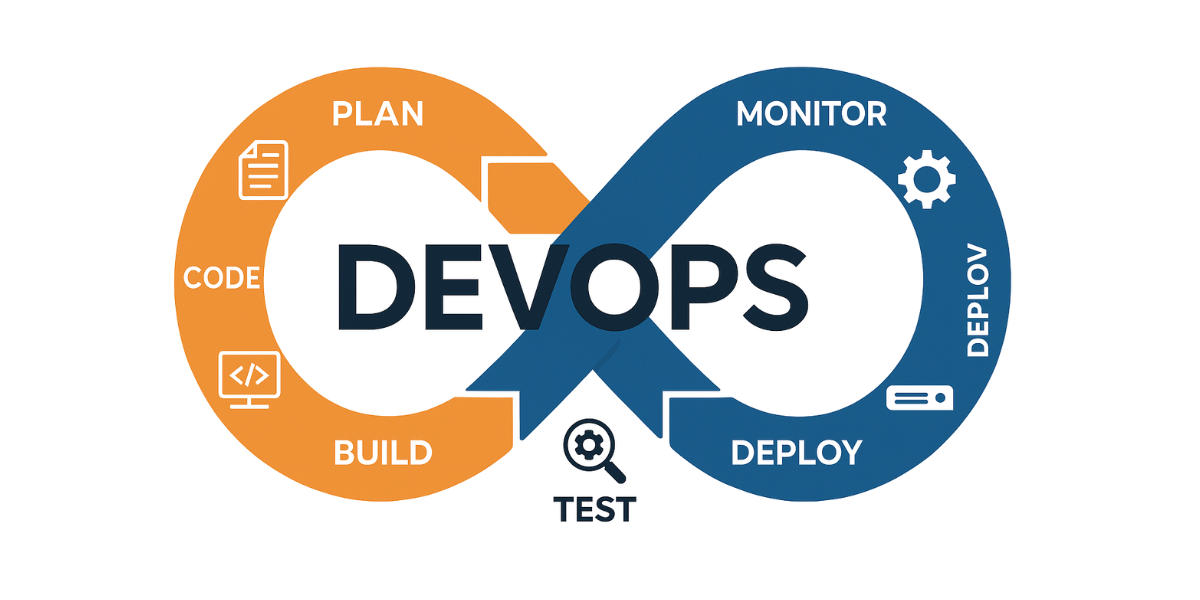Home > DevOps in 2025: Why Get a DevOps Certification?
DevOps is a hot topic, but between theory and practice, how can you make a difference in 2025? This article guides you through the evolution of the field, explains the importance of a DevOps certification, and its real impact on your career. We’ll also show you how to choose the right training and adapt your skills to meet the needs of tomorrow’s companies. Ready to jump in?

With the rise of cloud technologies and the advent of AI, DevOps methods are undergoing a major transformation. Automation tools are reshaping business processes, while artificial intelligence opens new horizons.
To stay competitive as a DevOps engineer by 2025, mastering certain technical skills is essential. These skills help meet business expectations while adapting to technological changes.
By developing these skills, you’ll position your company to face tomorrow’s technological challenges. Notably, 90% of DevOps users and managers favor greater AI integration in the testing phase of DevOps workflows.
The impact of artificial intelligence on CI/CD pipelines is significant. It notably optimizes environment management, improves code quality, and shortens time to production. A real revolution for teams managing complex applications.

Cloud-native architectures and containers are redefining IT processes. Kubernetes has emerged as the benchmark for orchestrating deployments, simplifying software product delivery. For a deeper dive, the comparison Kubernetes vs Docker offers useful insights.
| Tool | Key Features | Advantages for Hybrid Infrastructures |
|---|---|---|
| Terraform | Infrastructure as Code (IaC), multi-cloud provisioning | Consistent infrastructure management across different clouds (public, private, hybrid). Unified automation workflows. |
| Kubernetes | Container orchestration, automated deployments, dynamic scaling, self-healing | Automation and continuous integration (CI/CD) facilitating deployments across various environments. |
| OpenShift | Multi-cloud deployment management and edge computing | Create and run applications across various types of IT infrastructures. |
| Azure DevOps Services | Code sharing and tracking, automated builds, CI/CD pipelines | Comprehensive suite for managing the application lifecycle in a hybrid environment. |
| HashiCorp Consul | Network configuration automation, secure connections, service discovery | Automates network configurations, enables secure connections, and facilitates service discovery across uptime or cloud environments. |
| Zapier | No-code automation platform | Easily create connections between various cloud and on-premise applications. |
| AI Tools (e.g., Guru, IBM Watson) | Advanced automation, predictive analytics | Optimizes processes, improves decision-making, and automates complex tasks. |
Securing software supply chains is becoming essential. DevSecOps is profoundly transforming the development cycle by integrating data protection right from the application design phase. A major challenge for companies facing increasingly strict regulations. The DevOps Foundation training helps you acquire these best practices.
In summary, DevOps remains a strategic lever for balancing speed of delivery and product quality. Teams that embrace new tools and continuously train their members will stay ahead of the competition.

In a demanding job market, these DevOps certifications give you a serious competitive edge. They clearly demonstrate your DevOps expertise, a true asset for landing key positions. Recruiters often see them as proof of mastery over current tools and methods.
Did you know that certified profiles generally see their salaries increase by 20 to 30%? This gap reflects their ability to manage complex deployments while maintaining a broad view of software development. A team trained in best practices quickly becomes a strategic asset for any company.
DevOps certifications teach operational techniques that enhance cross-functional collaboration. These skills directly impact the quality of delivered applications and the ability to quickly adapt to changes.

In the software development landscape, GitOps and immutable infrastructure are gaining traction among companies. These approaches enhance deployment security and reliability while streamlining processes. Did you know that a centralized repository can simplify IT environment management?
Digital twins (virtual replicas of real-world objects, processes, or systems) are also making waves in testing. This technology allows simulation of complex scenarios before real production deployment. The result? Fewer breakdowns, controlled costs, and higher-performing products. QA teams now have a powerful ally for optimizing their applications.
With the rise of multi-cloud and edge computing, environments are becoming increasingly complex. DevOps engineers must now juggle various tools like AWS while ensuring service interoperability. A real technical challenge!
To maintain system resilience at scale, several levers exist. Real-time monitoring remains crucial, but that’s not all. Teams must also design effective recovery strategies and monitor key indicators. The good news: specialized training courses are emerging to support this daily work.
It’s also worth noting that customers now demand seamless updates. This means adopting flexible methodologies capable of adapting to rapid technological changes. Companies investing in their code base today will reap the benefits tomorrow.

DevOps acts as a true driver for digital transformation. Its strength? Aligning technical methods with business priorities while clearly measuring financial impact.
Here’s a real-world example: a company reduced its time-to-market thanks to proven DevOps tools. By bringing technical and operational teams closer together and optimizing deployment processes, the results spoke for themselves. Software development time was cut in half, enabling faster product releases to the market.
How can you replicate this success? First, by promoting collaborative work between developers and operations teams. Then, by investing in continuous integration tools that streamline testing and production releases.
But beware: the key lies in progressive adaptation. Instead of a drastic revolution, favor incremental changes. Train your teams in new practices while maintaining stable production environments. This approach allows you to balance innovation with operational continuity.

To get started, first identify the skills you need to certify. A structured approach will guide you to create your skills assessment and select the certification aligned with your career goals.
Studying typical career paths by profession is essential to tailoring your strategy. Which certification should you prioritize for application development? Cloud operations? Software architecture? As a DevOps engineer, you manage daily collaboration strategies, code tools, infrastructure, and also the testing and deployment phases. DevOps certifications cover all these processes, from continuous integration to production monitoring.
These programs target both technical teams and project managers. They officially validate your mastery of key software and methodologies like Agile. Trainings are often organized around job roles, with a focus on managing modern IT environments. A bonus? They usually include practical case studies for companies, such as deployment simulations on AWS.
Your skills changes become visible and measurable, a real asset for advancing within demanding IT teams.
In a fast-changing sector, continuous learning is essential. To stay technically up-to-date, following the evolution of DevOps is a must—whether it’s updating your knowledge of recent tools or mastering emerging methodologies. Joining professional groups or specialized forums fosters continuous learning while encouraging the sharing of real-world experiences within teams.
Highlighting your certifications also means applying them to real-world projects. A DevOps certification not only proves your expertise—it demonstrates your ability to orchestrate complex processes in real environments. In fact, employers often see it as a sign of operational mastery over software and platforms like AWS. It’s worth noting that tech companies are increasingly favoring these certifications to identify candidates capable of leading large-scale application deployments.
As for DevOps training on AWS, it primarily targets the acquisition of practical skills. The goal? To enable engineers to efficiently manage the entire development cycle, from writing code to testing and production deployment. An approach that directly addresses clients’ demands for fast deliveries without compromising software quality.
In 2025, DevOps will focus mainly on three strategic pillars: enhanced agility, integrated security, and operational AI. You see, the challenge goes beyond productivity alone. So why wait? A targeted certification could redefine your key skills, providing a real lever for your professional growth. Your future starts today…

Which DevOps certifications are the most recognized in 2025?
The most sought-after are the AWS Certified DevOps Engineer – Professional, the Microsoft Certified: DevOps Engineer Expert, and the Google Cloud Professional DevOps Engineer. Others, such as the Docker Certified Associate, the CKA, or certifications from the DevOps Institute, validate key skills in automation and containerization.
How can SMEs adopt DevOps with a limited budget?
By training their teams through free or low-cost resources, leveraging open-source tools, and gradually automating tasks. Affordable cloud services also help avoid high infrastructure costs.
Which KPIs should be tracked to measure the success of a DevOps approach?
Deployment frequency, production release speed, change failure rate, incident resolution time, and user satisfaction are the key indicators.
How can you overcome resistance to change?
By involving teams from the start, clearly explaining the benefits, and offering appropriate support. Continuous training and celebrating successes help drive adoption.
How to automate regulatory compliance?
By integrating security from the design phase (DevSecOps), standardizing environments through Infrastructure as Code, and using automated compliance testing. Continuous monitoring and traceability ensure ongoing compliance.
What are the effects of DevOps on company culture?
DevOps promotes collaboration, autonomy, and accountability. To fully benefit, it’s essential to train teams, share objectives, and establish effective incident tracking practices.

ITTA is the leader in IT training and project management solutions and services in French-speaking Switzerland.
Our latest posts
Subscribe to the newsletter
Consult our confirmed trainings and sessions

Nous utilisons des cookies afin de vous garantir une expérience de navigation fluide, agréable et entièrement sécurisée sur notre site. Ces cookies nous permettent d’analyser et d’améliorer nos services en continu, afin de mieux répondre à vos attentes.
Monday to Friday
8:30 AM to 6:00 PM
Tel. 058 307 73 00
ITTA
Route des jeunes 35
1227 Carouge, Suisse
Monday to Friday, from 8:30 am to 06:00 pm.